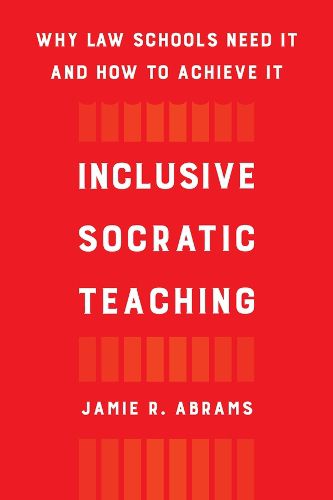Readings Newsletter
Become a Readings Member to make your shopping experience even easier.
Sign in or sign up for free!
You’re not far away from qualifying for FREE standard shipping within Australia
You’ve qualified for FREE standard shipping within Australia
The cart is loading…






For more than fifty years, scholars have documented and critiqued the marginalizing effects of the Socratic teaching techniques that dominate law school classrooms. In spite of this, law school budgets, staffing models, and course requirements still center Socratic classrooms as the curricular core of legal education. In this clear-eyed book, law professor Jamie R. Abrams catalogs both the harms of the Socratic method and the deteriorating well-being of modern law students and lawyers, concluding that there is nothing to lose and so much to gain by reimagining Socratic teaching. Recognizing that these traditional classrooms are still necessary sites to fortify and catalyze other innovations and values in legal education, Inclusive Socratic Teaching provides concrete tips and strategies to dismantle the autocratic power and inequality that so often characterize these classrooms. A galvanizing call to action, this hands-on guide equips educators and administrators with an inclusive teaching model that reframes the Socratic classroom around teaching techniques that are student centered, skills centered, client centered, and community centered.
$9.00 standard shipping within Australia
FREE standard shipping within Australia for orders over $100.00
Express & International shipping calculated at checkout
For more than fifty years, scholars have documented and critiqued the marginalizing effects of the Socratic teaching techniques that dominate law school classrooms. In spite of this, law school budgets, staffing models, and course requirements still center Socratic classrooms as the curricular core of legal education. In this clear-eyed book, law professor Jamie R. Abrams catalogs both the harms of the Socratic method and the deteriorating well-being of modern law students and lawyers, concluding that there is nothing to lose and so much to gain by reimagining Socratic teaching. Recognizing that these traditional classrooms are still necessary sites to fortify and catalyze other innovations and values in legal education, Inclusive Socratic Teaching provides concrete tips and strategies to dismantle the autocratic power and inequality that so often characterize these classrooms. A galvanizing call to action, this hands-on guide equips educators and administrators with an inclusive teaching model that reframes the Socratic classroom around teaching techniques that are student centered, skills centered, client centered, and community centered.